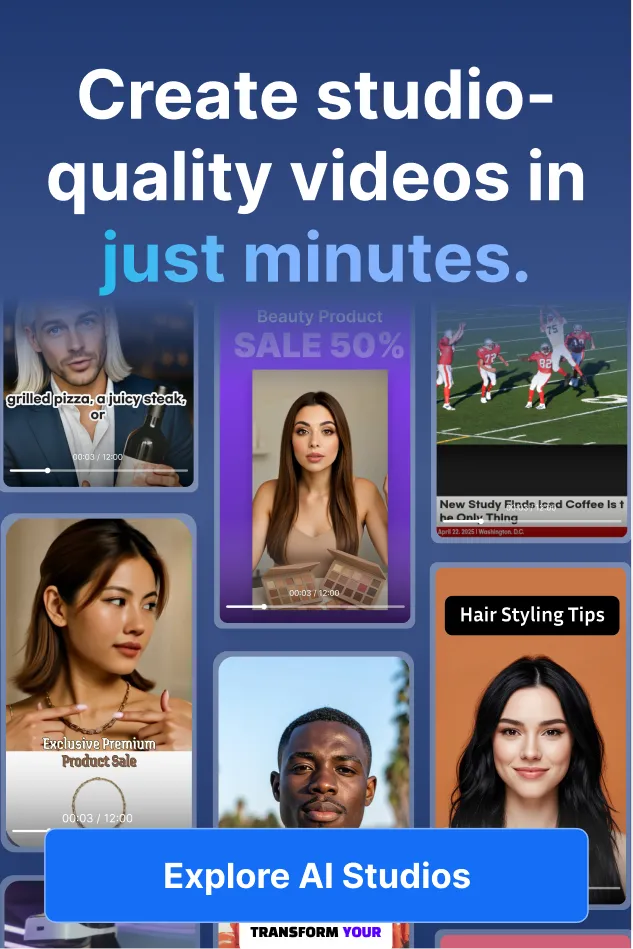Learning & Development teams are under pressure to do more with less—more training, faster rollouts, broader reach, and better engagement. That’s where AI comes in.
The best AI tools help L&D professionals scale course creation, convert documents into videos, localize content into multiple languages, and make personalized learning possible—without needing full production crews or developers.
Here are 8 top AI platforms for L&D teams in 2025.

1. AI Studios by DeepBrain AI
Best for: Turning training scripts into presenter-led videos
AI Studios lets you create high-quality training videos using just a script and an image. Upload a headshot to generate a custom avatar, choose from over 110 languages, and produce 4K videos in minutes—with no filming required.
Why L&D teams love it:
- Create explainer videos, onboarding modules, or product walk-throughs fast
- Use your own avatar or select from a library of AI presenters
- Voice cloning makes content feel personal and trustworthy
- Auto lip-sync and scene transitions streamline production
- Works well for microlearning, async updates, and localized training
2. Synthesia
Best for: Formal training modules and multilingual onboarding
Synthesia offers structured, slide-based video creation with AI avatars and narration. It’s a great option for compliance training, onboarding, or scenario-based learning in corporate environments.
Key features:
- Dozens of avatars, multi-language voiceovers
- Scene-by-scene script editor
- SCORM-compatible export for LMS upload
- Custom avatars available on enterprise plans
3. Scribe
Best for: Auto-generating step-by-step software guides
Scribe watches you complete a task and instantly creates a visual tutorial with screenshots and instructions. It’s a huge time-saver for software training, system walkthroughs, or documentation.
Why it's useful:
- No screen recording needed
- One-click export to PDFs, embeds, or LMS
- Great for SOPs, onboarding manuals, or help desk resources
4. Lumen5
Best for: Converting documents or scripts into short training videos
Lumen5 transforms written content into visual slide-style videos using AI-selected imagery and voiceover. It’s great for turning policy updates, internal blogs, or handbooks into quick-learning formats.
Highlights:
- Visual-first editor with drag-and-drop
- Voiceover or text-to-speech options
- Useful for bite-sized content or refreshers
5. ChatGPT (OpenAI)
Best for: Generating assessments, training outlines, and content drafts
ChatGPT helps L&D teams brainstorm ideas, write microlearning scripts, generate quiz questions, or simplify technical content. You can also ask it to localize content or adapt tone for different audiences.
Best use cases:
- Course planning and instructional design support
- Scenario writing and role-play dialogue
- Language adaptation for global teams
6. Murf.ai
Best for: Natural-sounding voiceovers in training videos
Murf offers high-quality AI voices that sound human and engaging—without sounding overly polished. It's perfect for narration-heavy content where avatars aren't needed.
Why L&D teams use it:
- 120+ voices in 20+ languages
- Control pitch, speed, and pauses
- Easy voiceover updates without rerecording
7. Descript
Best for: Editing audio and video training content with transcripts
Descript is great for teams working with recorded content. You can cut filler words, re-record lines with AI voice matching, and edit by simply editing the transcript.
Top uses:
- Fixing training webinars for reuse
- Repurposing live training into microlearning clips
- Captioning and subtitling
8. Otter.ai
Best for: Transcribing live sessions and meetings into usable content
Otter transcribes conversations in real time and organizes notes automatically. It’s useful for turning SME interviews, team meetings, or coaching sessions into actionable learning content.
Best for:
- Capturing knowledge from subject matter experts
- Auto-tagging keywords and generating summaries
- Sharing meeting recaps for L&D documentation
Smart Learning Starts With Smart Tools
The right AI tools free your L&D team from repetitive tasks—so you can focus on learning impact, not formatting content. Whether you're building global onboarding programs or modernizing legacy training, these tools help you move faster, stay consistent, and reach more learners.



